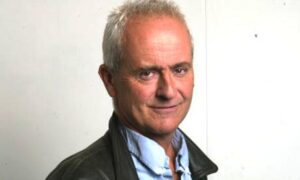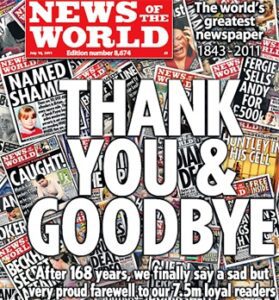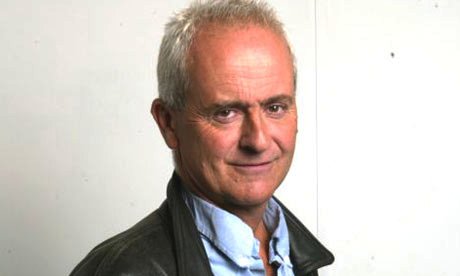
JMU Journalism talks to Nick Davies of the Guardian. His explosive story about the News of the World hacking into the phone of murdered schoolgirl Milly Dowler started an incredible sequence of events. It began with the closure of the NOTW, and several high-profile arrests, before culminating with the public humiliation of Rupert Murdoch, the resignation of Britain’s top two policemen, and Prime Minister David Cameron facing an epic personal crisis.
Journalist Nick Davies admits he has been left stunned by the colossal impact of exposing the phone hacking scandal.
It has brought an empire to its knees, and helped to unravel the complex web of deferential relationships which have entangled the very top of British politics, journalism and the Metropolitan Police force.
Mr Davies told JMU Journalism: “It feels unreal. The scale and the pace of the effects of the stories were so great that it has been difficult to absorb.”
The Guardian reporter, who first described the ‘dark arts’ in his 2008 book ‘Flat Earth News’, saw his long campaign to expose illegal practices within the industry finally rewarded, and the resulting firestorm engulfed virtually every aspect of the upper echelons of the UK establishment.
He said: “I was contacted by somebody who knew that News International were lying. They acted as a kind of guide, pointing me towards the truth.”
But it was not until a story written by Mr Davies and published by the Guardian on July 4th that the full extent of that shocking truth finally emerged. The article revealed that the voicemail of murdered schoolgirl Milly Dowler had been hacked by journalists or private investigators working on behalf of the News of the World.
It was only then that the country realised the severity of NI’s actions. Few could have predicted the monumental chain reaction which followed, but the journalist who broke the story was not among them.
“When I filed it, I told the Guardian editor [Alan Rusbridger] that I thought it was the most powerful hacking story so far, but I did not foresee the scale of its impact,” Mr Davies said.
Nick Davies became a journalist in 1976, and is the winner of several awards for his investigations into crime, drugs, poverty and other social issues. If there was such a thing as a journalists’ ‘Hall of Fame’, Nick’s phone hacking stories would surely make him an inductee, alongside Watergate reporters Bob Woodward and Carl Bernstein, who forced the resignation of US President Richard Nixon in 1974.
Yet, despite the unprecedented sequence of events that has unfolded over the last few weeks, Mr Davies is sceptical of his work resonating for years to come.
“I doubt very much whether we are seeing any form of long-term change,” he said. “I suspect that time will show that the discourse has not really changed at all. The hubbub will die down and a great deal of unpleasant normality will return,” the former Journalist of the Year added.

It will be some time yet before the full consequences are known.
News Corporation Chief Executive, Rupert Murdoch, and his son, News International Chairman James Murdoch, have appeared before the Culture Media and Sport Select Committee; the first time in 40 years a “humbled” Mr Murdoch Snr has been quizzed by Parliament about his business, when he is much more accustomed to suggesting to successive Prime Ministers what he would like them to do.
The current PM, David Cameron, is under fire over his judgment in hiring ex-NOTW editor Andy Coulson as his director of communications, and his personal relationships with the Murdochs and Rebekah Brooks. The latter resigned from her NI Chief Executive role shortly before being questioned by detectives about phone hacking while she was editor of the Sunday newspaper.
The top two Metropolitan Police officers, Commissioner Sir Paul Stevenson and his deputy John Yates, have resigned over their links to arrested former NOTW Deputy Editor, Neil Wallis, and also following widespread criticism of the way their original investigation was handled.
Sadly, whistleblower Sean Hoare, who worked as a showbiz reporter for the NOTW and the Sun, has died aged 47. He had succumbed to drink and drug problems and was sacked by Coulson before he revealed how phone hacking was “endemic” in the industry.
An inquest is awaiting histology and toxicology results and a post-mortem identified other health problems. Mr Davies respectfully calls Sean Hoare a courageous “Fleet Street man”, in one of many articles he has written since the scandal broke, including the latest revelation that the mother of murdered schoolgirl Sarah Payne was also a phone hacking target of the NOTW, who championed ‘Sarah’s Law’ .
A systematic review of how the press is regulated in future will now take place, but Nick concedes he is not sure what the ramifications are likely to be. He told JMU Journalism: “Nobody knows the answer to this. There is a basic riddle to be solved: how do you regulate a free press? I am glad that we have a judicial inquiry where we can try to analyse some very complex issues.”

